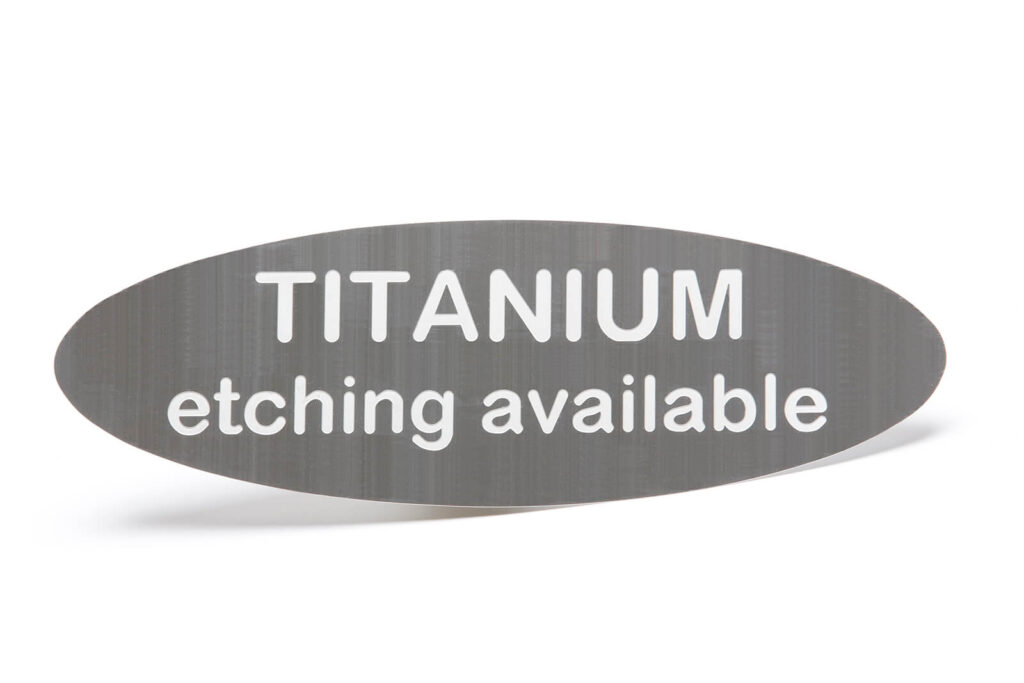This website uses cookies so that we can provide you with the best user experience possible. Cookie information is stored in your browser and performs functions such as recognising you when you return to our website and helping our team to understand which sections of the website you find most interesting and useful.
Exotic Metal Etching
The best way to produce components from exotic metals like Titanium, Tungsten, Molybdenum, and almost any metal or alloy is through photochemical etching. Etching exotic metal requires etchants that can cut through the oxidized coating that forms when the raw metal is exposed to air. Fotofab has developed proprietary etchants that dissolve these extremely corrosion-resistant metals while being on the lower end of the hazard range.
Our precision-etched metal parts are manufactured in both prototype and production quantities.
Fotofab products are made in the USA and distributed worldwide.

Tolerances for Chemically Etched Exotic Metals
Fotofab works with metals ranging from 0.0005″ to 0.062″ thick. Minimum etched features can vary but generally follow these guidelines:
- Minimum hole feature is 120% of metal thickness
- Minimum bar width is 90% of metal thickness
- Dimensional accuracy increases as metal thickness decreases
- Minimum hole feature is 120% of metal thickness
Benefits of Chemically Etching Exotic Metal
Intricate designs are easily manufactured in exotic alloys with chemical etching. Thin metal parts can be manufactured without distortion. Our chemical etching process is ideal for exotic metals such as titanium, tungsten, and molybdenum, and will not stress the metal or alter its physical properties compared to traditional manufacturing processes. Components produced from Fotofab’s chemical etching process are burr-free and stress-free.
Titanium
Titanium is renowned for its lightweight, corrosion resistance, and strength, and is often used in the fabrication of eyeglasses, antennas, satellite components, jet engines, and more. Fotofab is a leading supplier of component parts made from chemically etched titanium.
Tungsten
Tungsten is known for its remarkable robustness and high melting point. In its raw form, it is a hard steel-grey metal that is often brittle and hard to work. Using the photochemical etching process, Fotofab is able to retain the physical properties of tungsten without introducing blunt force and potentially causing stress fractures.
Molybdenum
Molybdenum can withstand extreme temperatures without expanding or softening. It is often used in the production of alloys to increase their hardness, strength, electrical conductivity, and resistance to wear and corrosion. It is often combined with Copper when weight limitations are a factor.
Applications of Exotic Alloys
Medical, aerospace, and defense industries have the most applications with exotic metals.
Applications for exotic metal etching include:
- Medical device parts with biocompatibility characteristics
- Aircraft components that are strong, robust, and lightweight
- Components that require a high melting temperature and extreme corrosion resistance.
No matter the application,
Tooling Costs for Exotic Metals
The photochemical etching process allows a new part to be tooled within a couple of hours and manufactured the same day. To begin an order, we simply need a dimensional drawing for our drafters to generate the phototool for the part. The phototool masks off certain areas of the exotic metal so that certain features of your metal part can be etched.
For more information on phototools and the Fotofab process check out the etching page of our website.
Available Metals
Explore Metals We Chemically Etch
Here at Fotofab, we provide photochemical machining (chemical etching, acid etching) services for a wide range of metals and alloys.
Fotofab is committed to quality.







